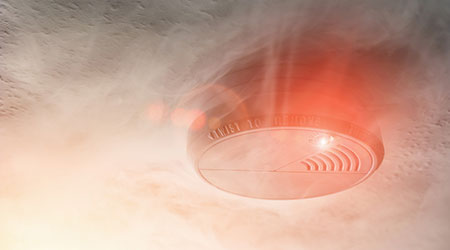Q: I have been told that if we have smoke detectors that are more than 15 years old, then they are required to be replaced with new ones. Is there a code for this? I have asked our vendor to test our smoke detectors for sensitivity, and they said we need to replace all of them. We do have an older panel where they would have to go point by point to do this, rather than measure the sensitivity at the panel.
A: Whether addressable or conventional, there’s no code that mandates the replacement of a smoke detector so long as it’s sensing smoke per the manufacturer’s listed sensitivity range. Each detector’s sensitivity must be verified via one of the methods outlined in NFPA 72 (2010) Table 14.4.2.2.14(g)(1).
I’d advise the owner to have the testing company describe their sensitivity test methods and compare it with the allowed methods. I can tell you from experience that some vendors view a ‘chamber entry’ test as a sensitivity test. A chamber entry test just tests the ability of smoke to enter the sensing chamber and activate the detector, not the sensitivity of the detector to the presence of smoke. Just spraying smoke at a detector is not a sensitivity test.
There is a rule of thumb that it’s best to replace detectors after 15 years, but its purpose is to keep from getting nickel & dimed by dying detectors, much like getting nickel & dimed by a 15-year-old car. It’s a good idea to get in front of device replacement circuit by circuit in order to control costs and avoid paying for emergency overtime service calls.
This answer was provided by Gene Rowe, Director of Business Development at Affiliated Fire Systems, Inc.
Brad Keyes, CHSP, is the owner of KEYES Life Safety Compliance, and his expertise is in the management of the Life Safety Program, including the Environment of Care and Emergency Management programs.

 Healthcare and Resilience: A Pledge for Change
Healthcare and Resilience: A Pledge for Change Texas Health Resources Announces New Hospital for North McKinney
Texas Health Resources Announces New Hospital for North McKinney Cedar Point Health Falls Victim to Data Breach
Cedar Point Health Falls Victim to Data Breach Fire Protection in Healthcare: Why Active and Passive Systems Must Work as One
Fire Protection in Healthcare: Why Active and Passive Systems Must Work as One Cleveland Clinic Hits Key Milestones for Palm Beach County Expansion
Cleveland Clinic Hits Key Milestones for Palm Beach County Expansion